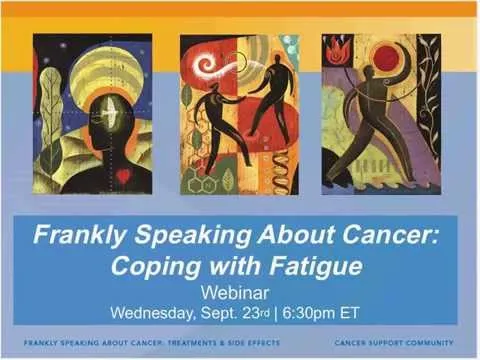Fatigue is described as feeling tired, weary, exhausted or worn out, often more intense than has ever been experienced before. Fatigue is the most common complaint of people with cancer, as it can result from the effects of the disease itself and from treatment as well.
Fatigue
Fatigue is one of the most common and toughest side effects of cancer treatment. It is more than just being tired. Fatigue is feeling physically, emotionally or mentally exhausted. You may have trouble finding the energy for even the simplest tasks, and this feeling does not go away with rest. It is important to tell your health care team if your energy is low. Fatigue usually lessens over time, but it is sometimes caused by anemia or blood loss that can be treated with medication. Sometimes fatigue is confused with depression, a psychological condition treatable with counseling or medication.
Fatigue is a side effect that is cumulative. This means you may only experience a small amount of fatigue after your first treatment but the amount of fatigue will likely grow as your treatment continues. Fatigue does improve after treatment has finished but it does take some time to feel like you did before your treatment. There are strategies your doctor or nurse can discuss with you to help manage fatigue. It is difficult to predict how fatigued you will feel because every side effect is different for each person. Also, some therapies cause more fatigue than others. In most cases, you will gradually begin to feel less fatigued when your treatment ends.
Prepare to talk with your doctor by keeping track of your fatigue. Write down when you feel fatigue. Note the time of day, how tired you feel on a scale of 0-10 (with 10 being the most tired), how long the feeling lasts and anything you do that makes it better or worse. This information will help your doctor understand what you are going through. Be sure to bring up fatigue when you talk with your doctor or nurse, even if they do not ask about it.
Coping with Fatigue
-
Ask for Help
-
Ask family and friends to help make meals and assist with other daily tasks. Eat healthy foods, avoiding greasy and fried foods.
-
Take on less. Cut back on responsibilities, volunteer commitments and even favorite hobbies.
-
Notify your healthcare team if onset of fatigue is new and ask them for advice in regards to management.
-
Set realistic goals for what you want to accomplish for the day and ask others to help you.
-
-
Stay positive
-
Take it one day at a time and look at each day as a fresh start.
-
Try something you did not do yesterday.
-
If you are getting discouraged by your lack of energy, talk to your health care team about what can be done to help.
-
Drink at least 8 glasses of water or fluid a day, unless instructed otherwise by your doctor, and avoid alcohol.
-
Break your day down into smaller chunks of time. Try staying in the moment for 15 minutes at a time.
-
Be mindful of this present moment, leave the past behind, and leave worries of tomorrow for tomorrow. Focus on THIS moment you are living in.
-
-
Take breaks
-
Take breaks and rest throughout the day. Do not feel guilty on rest days.
-
Try not to overdo it on higher energy days, so you can conserve your energy.
-
Take five deep breaths, all the way down through your diaphragm. It helps increase the circulation of oxygen in your body.
-
Take time to meditate. Meditation is proven to benefit cardiovascular and immune health.
-
Aim to sleep at least eight hours each night. Wake up and go to bed at the same times each day.
-
Take time to rest or take a short nap (no longer than 45 minutes) during the day.
-
Try meditation, guided imagery, prayer or other strategies to help you relax and decrease stress.
-
-
Take advantage of good days
-
Organize your activities around your best times of the day where you have the most energy.
-
Identify the time of day when you have the most energy and use this time for activities that are important to you, like getting work done or paying attention to your children.
-
On days that you have more energy, make soup or stews in bulk to have meals on hand.
-
Be as physically active as you can tolerate, starting slowly and building up to 150 minutes of activity spread over at least 3 day a week.
-
Spend time with your support network doing things you enjoy.
-
